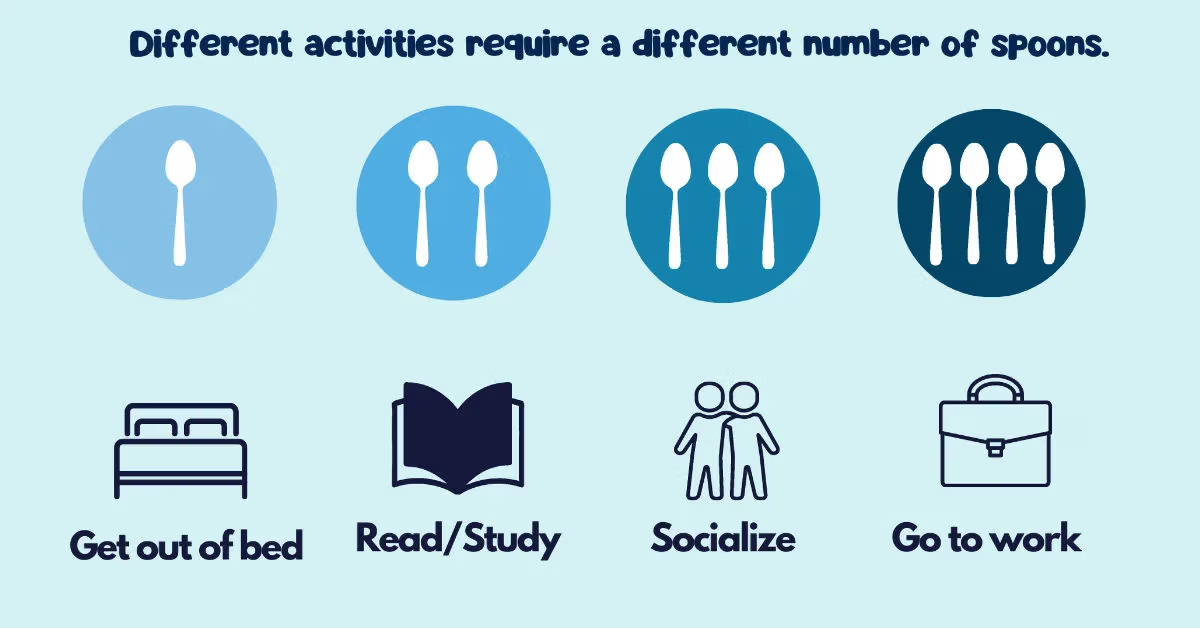How many spoons can you use today?
I heard about ‘spoon theory’ for the first time today. It makes sense at the basic level: activities take a certain amount of energy, the coinage for energy is spoons and you only have so much to spend before you run into debt.
However, all the charts I looked at are too generalised. People with chronic health problems have good and bad days, while these vague charts seem to assume an average day for an average person. Life’s not that simple, though some acknowledge this. Some charts are disorder-specific, while others cover mental health (people are draining!) and neurodivergence (people and life can be draining!)
(There are even spoon charts for dogs and fork charts for autism!)
For one of the more typical ones I looked at, a typical healthy person gets 40 spoons (each activity taking away one or more spoons).
A generalised assumption is a person with, say, Lupus (like the girl who came up with the idea) only has 12 spoons to spend.
Based on that chart, on an average day, I only have about 4 to start with; anything over that is increasingly draining. Draining, in my case, generally means crawling to bed, but I can collapse on the spot without even the energy to crawl off the floor to bed. To get up I have to drag myself to the bottom of the stairs and use the steps and bannister post to pull myself up, leaving, as my wife jokes, “snail trails in the carpet,” from my toes dragging behind me.
This can extend all the way to crash teams and emergency surgery. But to look at, at least sat down, I appear healthy enough.
My experience is hardly uncommon, but unless you live it or you are a carer for someone with it, it is hard to understand.
In my case, I have, among a long, complex list of issues, a neurological disorder and advanced kidney failure. I don’t say this for sympathy or “woe is me”. Sure, it can be depressing, but you adopt an “it is what it is” attitude. Life’s hard enough without beating yourself up every day for something that’s not your fault, that you can’t change, and that will never improve. I didn’t – don’t have a spoon metaphor in my head, but I have a very short list of “can do”, followed by a much longer list of “OK, but there will be a cost to pay back.” Simply having a shower can mean needing a few hours sleep and rest, something more energetic means I’m incapacitated for days.
Yes, it does make you feel useless, but I’m damned good with computers, so I do what I can to be useful :)
It does make you angry too, though, sometimes. You see some young, healthy people (or old, for that matter) moaning about every little thing, how life’s not fair… and you think, “Man, I’d be happy just to be able to walk the dog to the park – and you are whinging about taking the trash out!”
If you don’t know, you don’t know. That’s understandable. Up to my late 30s, I was fast, strong, fit, extremely healthy…
And then I wasn’t.
At the time, they give me six months to live. I still have an expiry date, but you can’t live thinking about that. You do what you can do, and it has to be enough.
When I was younger, in my teens or early 20’s, I got glandular fever. I wasn’t going to let that slow me down me. Spoons? LOL, they are for puddings. So I pushed through it. What’s the worst that can happen? Well, I was working in a chemical plant and passed out in an empty vat of copper sulphate. (We used to drill the crystals out with a pneumatic band jack). Anyway, they found me, several hours later, assumed I was shirking and told me to get out. I couldn’t even stand. I was off work for over six months because I thought I could push through the fatigue.
Using the spoon theory, I not only used up my spoon allowance, but I was also in debt for thousands!
You look on social media, anywhere, any day, and kids and trolls are like, “HA-HA!”
The truth is life can sneak up and give you such a kick in the stones that you never walk straight again. It can be a car or work accident, a sudden and debilitating illness, something new like long covid, or a congenital illness you were unaware of. Or simply getting older.
One minute you have boundless energy, the next, maybe your knees remind you you aren’t 18 anymore, or maybe you are counting spoons to make it day to day.
Allostatic load
Some of it is down to your natural physical and mental energy reserves and tolerances, how much oomph you’ve got before the tank is empty, and on a neurological and biological level, it’s down to something called the allostatic load. There are plenty of medical and academic papers on allostatic load if you are interested, but the essence is your body is a machine; it has tolerances, particularly relating to stress. If you put it in overdrive and gun it across rough ground, you risk things rattling loose. The more often you push your body, the worse it will be for you.
Take prolonged child abuse – the damage that it causes can be staggering. Typically, due to the increased risk of heart disease, mental health, etc., it lowers their life expectancy by 10 to 15 years. It quite literally wears the body out.
Equally, an adult working long, unforgiving hours for an angry, uncaring boss…
You can’t find anything else, and you can’t leave ‘cos you need to pay the rent and eat. Even if you are making ends meet, you burn out eventually. Said boss or company will replace you without a second thought, and you know it, yet you continue to turn up. You may end up punching the wall or sobbing yourself to sleep, but you’ll wake up with the alarm the next day for more punishment. Welcome to the 21st century.
As I say, you can research it, but if you keep running on an empty tank (mentally or physically), your body will start to fail. Heart, kidneys, joints, and so forth. The toll is paid by your four core biological systems: cardiovascular, metabolic, inflammatory, and neuroendocrine. Your susceptibility to illness increases, while the rising stress levels increase your risk of cancer.
Once things start to break down, your body will make its aggrievances known. All of a sudden, that boundless energy, those 40 spoons a day, is a thing of the past.
Your get up and go got up and went – and it ain’t coming back.
If the bolts you are shaking loose are underlying or undiagnosed health problems, you are going to regret not easing back on life’s throttle, ‘cos unlike your car, you can’t just replace the engine or undercarriage. You are stuck with that rusty old clanker!

Invisible disabilities
They call them “invisible illnesses” because, for some people, it’s like, “You have four limbs, do something, you wastrel.”
You (too frequently!) hear of nightmare tales where the people taking a disability claim act like you are snatching the money out of their own wallet. Complete lack of empathy or understanding. But understandable, too, as many people make false or extremely exaggerated claims. Reports of outsourced companies working for the DWP being rewarded for each claim they process and reject. Most of the time, so I hear, the decision is reversed on appeal. If you are on commission for denying people benefits, well, not hard to see how it’s incentivized.
Some of the tales I’ve heard (some firsthand) are almost unbelievable. One woman I know had her son’s claim questioned because “he should have grown out of that by now!” ‘That’ being Down’s Syndrome. Some assessors are totally unqualified; others are actually doctors and disgusted by it all.
Another, on a TV documentary, went something like this:
Assessor: “OK, now I need you to walk around the room”
Claimant: “You can see I’m in a wheelchair, right?”*
Assessor, shrugging: “These are the rules, I need to see you walk around the room, or we stop your benefits.”
Claimant, pulling the blanket aside to reveal both legs amputated above the knee. “How?”
Assessor, shrugging, “Crutches? I don’t make the rules.”
Another I heard of locally some years back – that was stomped on for its unfairness – involved a simple bus pass.
To apply, you had to attend a meeting in some office, up a narrow flight of stairs, on the third floor of an office building in Liverpool. If you didn’t attend, you couldn’t have the pass; if you did, well, you made it up the stairs, so there’s nothing wrong with you, is there, so you can’t have the pass!
The person I heard this from was in a wheelchair and had got a taxi to the office. His wife asked them to come down. They refused. Rules are rules, ma’am.
On medical arrogance, hubris and ignorance
True story :
One of my experiences – in a hospital actually, in A&E – was a junior doctor telling me to “Get out of the wheelchair and follow her.”
Now, I can walk a bit, albeit involving clinging to walls most of the time, but it’s not easy, and on a bad day like that…
Anyway – I swear – she turned her head, looking back, flipped her hair, and as she raced ahead, she said – and I quote, verbatim as the words were seared into my head:
I’m sorry, I forgot I have such long legs.
This wasn’t flirtatious or in any way coquettish but narcissistic. I’m old and grumpy and I know it; this was vanity. So full of of herself!
Firstly, I was in absolute agony and also presenting dangerously high malignant hypertension and tachycardia that put me at risk of dropping dead on the spot. Literally.
Secondly, she was all of 5’8″ if that, and at 6’1″, I was head and shoulders taller than her.
Anyway, she briefly examined me and told me to Go home and stop wasting my (her) time.
My blood tests also showed my kidneys had degenerated to the point of failure, but because I knew medical terms and – in her opinion – was “one of those people” that Google their symptoms and self-diagnose, well…
So she sent me home.
(Needless to say I got worse, a lot worse, and subsequently sued for medical negligence. Mostly ‘cos I was angry, but also because it had happened before in the same hospital, and the chief executive personally promised in a long (please do not sue!) apology to do better in future.)
As I explained to one of my consultants, it was sheer hubris. I’ve lived with my conditions for over 20 years; some of which are so rare or so complex that most doctors (or, it turns out, consultants) will never encounter them in their entire careers. (But they are covered in their exams). Even the consultants treating me say it’s almost unheard of and was subject to their roundtable talks.
Even beyond this – and this will be true of most people living with serious health conditions – I know stuff about my specific needs, limits and problems that most doctors are clueless about (as it’s not in their specialised field).
For instance, star fruit can be lethal to renal patients due to caramboxin.
But hey, I knew words like “tachycardia”; I was obviously “one of those people”.
A better doctor would understand this. Would know to ask questions like, “I know the condition, but how does it affect you because everyone is different?”
I (and perhaps you should) look at it like this. A junior doctor will have studied multiple fields for seven years to get their degree. So, a spell in renal, a spell in urology, a spell in cardiac, in theatre…, so a certain amount of respect is allowed.
(The average GP has an IQ of 130, so they aren’t entirely stupid either).
However, at this point, they are very much a jack of all and master of none.
Against this, a disabled person will have been living with their condition for decades, know their case history and medication backwards and quite possibly experienced operations, tests and procedures they have never even heard of.
Yet some of them have this “I’m a doctor, now, I know better than you!” attitude.
This next incident was several years back (I don’t get out anymore), but I recall shopping…
Using the metaphor, I used too many spoons and collapsed – in Boots of all places.
You’d think a chemist’s staff would be a bit understanding, but no. The staff lady that saw me – before I passed out – ran off. The only person to show any interest was an old woman of about 70.
Sympathy? Concern? Going to get help?
Nope!
Honestly, the old hag kicked me in the ribs until I came too and could drag myself out of her way – because she couldn’t reach something she wanted.
I understand, really, our town is full of drug addicts, alcoholics and worse. Still…
One evening I saw a bloke calling for help, asking me to get a policeman or something to help him. Explained how no one would help him because they assumed he was a junkie rather than disabled (and had, to use the metaphor, burned up all his spoons). (Even in the town centre, 100 yards from the station, it is surprisingly hard to find a cop, even one in a car, to flag down!)
Against this, even right outside the Asda supermarket, we had a spake of people pretending to collapse and need aid. If the person helping was in any way alone or vulnerable, their partner(s) would leap out of the bushes and mug them. It does not help matters!
Anyway, spoons…
Suggested reading
Cnet: How the ‘Spoon Theory’ Helps Explain Life With a Chronic Illness
The spoon theory is a helpful metaphor and tool for understanding how a chronic illness can affect your energy levels.
The Brain Charity: What’s spoon theory? The metaphor helping people with chronic illnesses and disabilities plan their days
Washington Post: Spoon theory: What it is and how I use it to manage chronic illness
Neurodivergent Insights: Spoon Theory For Autism and ADHD: The Neurodivergent Spoon Drawer (Feature image ‘borrowed’ from here)
Recommended: Knowing Your Allostatic Load Can Help Prevent Disease
Psychology today: What Does ‘Allostatic Load’ Mean for Your Health? Building resilience makes sense because your body pays for a lifetime of stress.
Science Direct: academic research papers and books on allostatic load



